Global - United Kingdom
After a career in banking and trading, David Wynne Finch was supplying imported Wagyu beef to discerning restaurants in the United Kingdom in 2003.  A Wagyu burger cost £55 at Zuma in Berkshire, London. The insatiable demand led him to import embryos from USA to be raised for breeding on 800 acres of the Voelas estate on the Llyn Peninsula in north western Wales. Radio 1 was played to encourage them to rub their haunches on electric massagers and their diet included beer from a local brewery.
A Wagyu burger cost £55 at Zuma in Berkshire, London. The insatiable demand led him to import embryos from USA to be raised for breeding on 800 acres of the Voelas estate on the Llyn Peninsula in north western Wales. Radio 1 was played to encourage them to rub their haunches on electric massagers and their diet included beer from a local brewery.
The herd was sold to Andrew Deacon in Suffolk. After his retirement, Andrew had visited the USA and raised Angus cross Herefords. He sought what he called the "ultimate" in beef and bought the small Wagyu herd that had been pioneered by Jonathan Denby from pure Wagyu embryos imported from Holland and has been expanding since. Andrew is running 150 head on pasture in Earl Stonham near Stowmarket and plans to expand to 500. Le Manor Aux Quat'Saisons was the first prestigious restaurant to serve his Wagyu.
Steve Ramshaw introduced Wagyu from Canada. Northumbrian Wagyu is in Newcastle Upon Tyne and they produce embryos and semen for sale in the UK as well as F1 beef for local customers. Sires that are presently being used are Itoshigenami, Michifuku and Haruki II.
Rob Cumine has been breeding Angus through Grass Cattle Ltd since 2005. A few years later he introduced Wagyu cattle on the lush grassland surrounding St Davids. He is focusing on fullblood breeding and only uses purebreds in the commercial herd. The first breeder in the UK to register Wagyu in a herdbook, Rob participates in Australia Wagyu Association BREEDPLAN. Pure Wagyu embryos are for sale and "Natural Wagyu" beef will be available online. Rob has recently taken up an appointment in Australia with the Wesfarmers retail chain Coles and is a director of the British Wagyu Breeders Association.
Blackford Farms is the home of "Highland Wagyu" which is owned by Martine Chapman and Mohsin Altajir, a husband and wife team, who moved from Dubai in 2011 to Scotland. Situated in the majestic heart of the Perthshire countryside in central Scotland, the estate spreads over 20,000 acres of rich fertile land with an abundance of water for breeding cattle. Wheat, barley and oats are grown. Martine runs the cattle enterprise across several breeds including Red and Black Angus, Highland, Shorthorn and Dexters.
Fullblood Wagyu heifers and two bulls were purchased with some embryos in 2011 from David Ismail. The embryos were implanted into pedigree Angus, Beef Shorthorn and Highland cows. A third Wagyu bull was bought plus some semen to broaden the genetic base and Highland Wagyu started to flush their own embryos. David Ismail's Wagyu herd was purchased in 2013. David's herd had origins from embryos from David Blackmore and other Australian breeders. 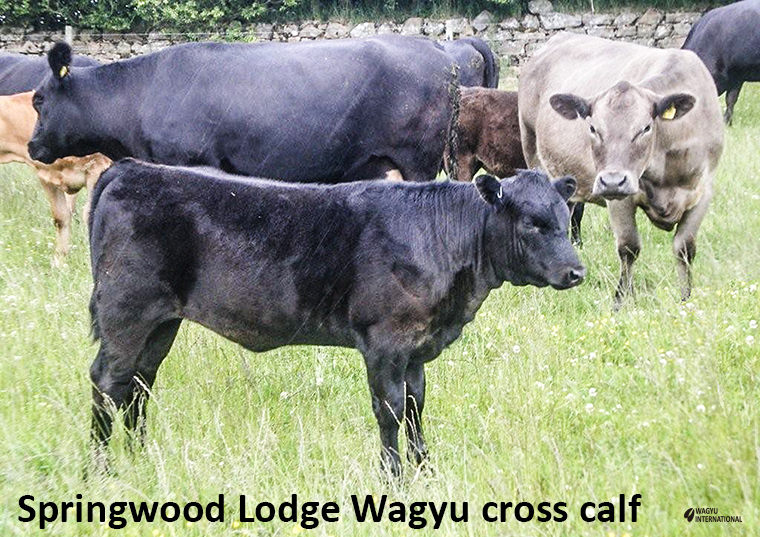
While commentating at the Beijing - Hong Kong Olympics in 2008 Mike Tucker first tasted Wagyu beef and realized that its unique and outstanding characteristics would be well received in Britain. Mike introduced Wagyu to the award winning dairy farm on Cotswold's lush green grass near Tetbury which has been in his family for over three generations. The "Newnton Herd at Church Farm" was established using pure genetics from Australia using Lake Wagyu black lines and Sumo reds from Gabni Wagyu. Pedigree links are maintained back to Japan by registering progeny with the Australia Wagyu Association. DNA parent verification to both parents ensures integrity of data. "We have stock on the ground and plan to have semen and embryos for sale later in the year. The bloodlines go back to some of the very best out of Japan."
Mike Tucker passed away suddenly on 28th March 2018 aged 73. As founding Chairman, Mike had been the driving force behind the WBA since its launch in November 2014.
F1 production is out of Angus and marbling is 4-5 and worth £2,500 to £3,000. The goal is to produce a 400+ kilogram carcass at no more than 30 months of age which marbles 6-7 and may come from fullbloods or purebreds.
"Despite the austure times, once people have tasted Wagyu they want to come back despite the added cost whether it be for a Wagyu burger or a prime steak". Mike considers that marbling is the most important factor in marketing now, and also being able to prove that it is genuine Wagyu.
Multiple award winning "Ifor's Welsh Wagyu" is local UK fare from Upper Bryntalch Farm, Abermule, Montgomery, Powys in Wales. The herd was established from "Westholme" genetics in 2006. Ifor raises his first and second cross Wagyu the traditional Japanese way on clover rich pastures before finishing on a grass or hay and blended grain ration. Waste beer from nearby Monty's Brewery is fed to the finishing animals plus the occasional massage. He believes this helps to reduce stress which produces tastier beef. Output is three carcasses a month with marbling estimated 3-5 mainly through online sales. "Ifor's Welsh Wagyu" is in high demand and a variety of rolls, roasts, steaks, diced beef, mince, meatballs are available. Roasts average per £15.00 per kilogram and rib eye, sirloin, minute flat iron, rump and fillet steaks range from £26 to £136 per kilogram in convenient packs.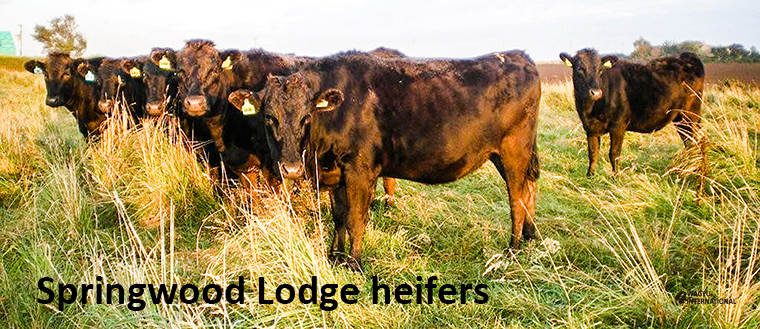
Christopher Leith of "Springwood Lodge" in Aberdeenshire, Scotland introduced Wagyu bloodlines independently to the UK. He had read about Wagyu cattle in the Farmers Weekly where it was reported that Australian dairy farmers were adding value to their calves by using a Wagyu bull. He was unable to source any genetics from Australia but imported fullblood embryos sired by Yojimbo from Bob Estrin on Lone Mountain Ranch. Initially he selected sires which had good size with marbling and embryos were implanted into Angus recipient heifers that had been destined by a neighbour for slaughter. One of the first bull calves was kept intact for breeding and has been used on unrelated pure Wagyu heifers and the Angus recipient cows. The costly establishment of a base of pure dams has been completed with 20 pure cows and 22 Angus cows calving next year. Imports of pure genetics are continuing for the breeding of stock bulls. Christopher registers fullblood Wagyu through the American Wagyu Association so is maintaining links back to Japan. Semen from his first bull has been exported to Ireland and Switzerland. Other pure Wagyu breeders in the UK sourced genetics from Australia so there is some outcrossing with his American lines from local sales.
Christopher describes his finishing regime “The pure Wagyu steers are finished at 30 months old having been on a mainly maize based ‘starter diet’ from 8-14 months old and on a more barley based ‘finisher diet’ from 14-30 months old. Good hay is a very integral part of the early feeding though for the finishing animals the quality doesn’t need to be so high. The Angus cross steers and heifers are fed the same way but are slaughtered at about 24-25 months old as the maturity is not quite as important as it is for the pure animals”.
Pure Wagyu steers have been processed at 520 kilogram but they will be taken off earlier at 450 kilogram dead weight from now on and the crosses at around 350-375 kilogram. He hopes to average £10.00 per kilogram across the carcase.
Christopher continues “I sell rib eye and sirloin steak to the Marcliffe Hotel in Aberdeen with the rump and fillet from these animals going to colleagues and friends. The lesser cuts are made into burgers which are again sold to local hotels, colleagues and friends though I am currently developing a market with a major catering company for these. In addition to this I also have a market at the Gleneagles Hotel in Perthshire who take an entire animal from time to time”.
Embryos were imported from Sutton Creek Cattle Co, USA and 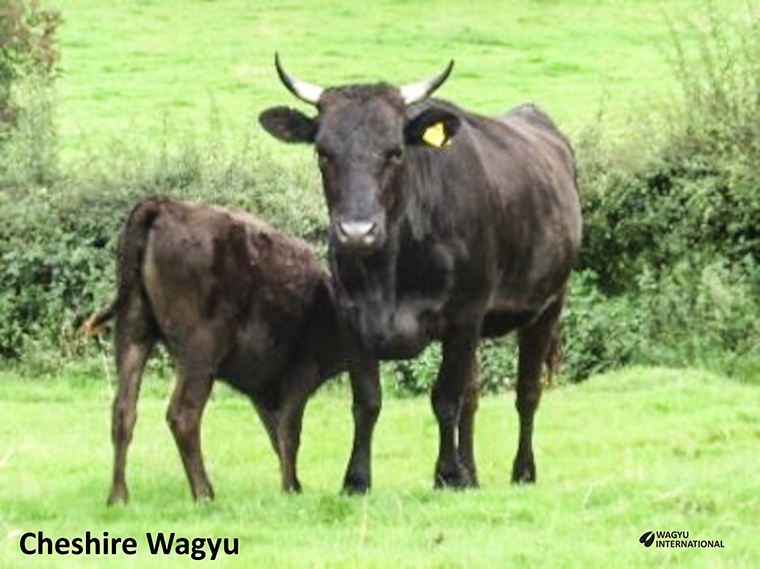 implanted by Richard Bailey at Rushton Spencer. The first Fullblood calves were born in December 2008 and Shikoodoji was the first bull to be raised and is registered with the Australian Wagyu Association. "Cheshire Wagyu" provide semen and embryos for sale.
implanted by Richard Bailey at Rushton Spencer. The first Fullblood calves were born in December 2008 and Shikoodoji was the first bull to be raised and is registered with the Australian Wagyu Association. "Cheshire Wagyu" provide semen and embryos for sale.
Joe McGinnis with "Glebe Wagyu" is on the Derry/Donegal in Northern Ireland. He started breeding Wagyu in 2011 with a fullblood Wagyu bull on Hereford and Angus cows. The herd of 80 head is mainly F1 Wagyu cross but next year F2 cross and more Fullblood are due.
Calves are weaned in autumn at around seven months with a creep feed with minerals, barley, corn, etc. which is offered from around 6 weeks. This is maintained through to the spring along with very good quality high dry matter silage and straw. A similar ration is given each winter until stores are coming up to 24 months of age where they will be finished on grass if possible to 30 months or carried over with a finishing ration the following year.
Ideal weather provides good quality grass and this is the base for low cost production. Current wholesale prices are in the range of £3.50-£4.00 per kilogram dressed weight. A premium of £10.00 per kilogram is expected to be realised from the infusion of Wagyu. Customers are lined up from the local restaurant trade from the first production due next year. “Our future plans include increasing the overall quality and consistency of the product while reducing the input costs through working with traditional breeds such as Dexter and Hereford - therefore lowering the levels of management required for the herd and hopefully increasing margin”.
![]()
"Irish Kobe Wagyu" is in the Ring of Gullion in County Armagh in Northern Ireland. It is an area that is steeped in history with beautiful scenery and plenty of grass, water and air to produce healthy beef.
The process to raise Wagyu was started by Peter O'Hagan in 2005 and plans were set into motion after tasting sensational, authentic Kobe Beef in the port city in Japan the following year. Embryos were imported from New Zealand and the first fullblood Wagyu were born in 2007 and they were registered through the Australian Wagyu Association.
On the farm, cattle are raised and managed in a stress free natural environment. This includes leaving all calves with their mothers for as long as possible before weaning to guarantee the best start.
Irish Wagyu cattle are fed a diet of grass in the summer and fresh silage in the winter. This is supplemented when needed with meal that includes vitamins and minerals.
They lead a free range lifestyle and are only housed when absolutely necessary. This keeps them healthy and comfortable.
The cattle are allowed to grow slowly and naturally. This, along with using pure Wagyu bulls, leads to beef that is tender and full of flavour.
The flavour and tenderness of the beef is ensured throughdry-ageing while hip hung for a minimum of 21 days. 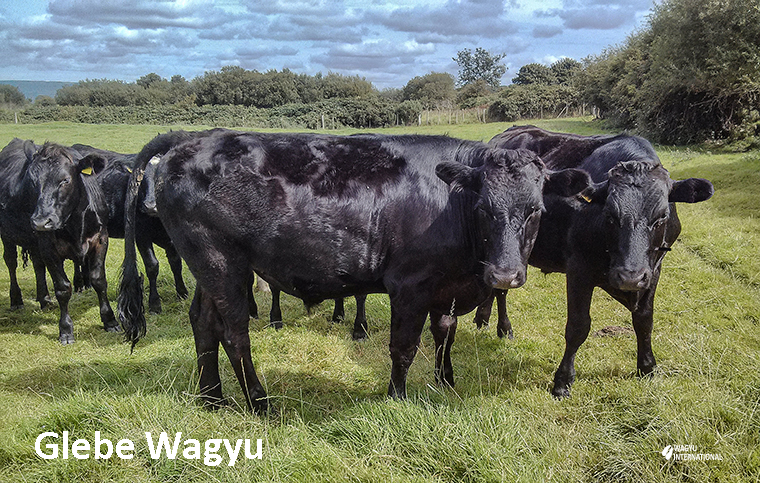 Craft butchers check the beef each day after 21 days of dry aging to judge the perfect time to parcel the delicious cuts. They are then vacuum packed to capture the beef in this perfect state.
Craft butchers check the beef each day after 21 days of dry aging to judge the perfect time to parcel the delicious cuts. They are then vacuum packed to capture the beef in this perfect state.
"To ensure all Irish Wagyu Beef is at its best, we blast freeze our parcels at just over 21 days of maturation. Since our beef has been dry aged, it contains much less water than beef that is wet aged in plastic".
"To further help, we freeze our beef using blast freezers. This method involves fast freezing, resulting in no loss in eating quality".
Semen, embryos, bulls and pregnant surrogate cows are on offer.
After two years spent establishing one of the biggest wagyu cross and Wagyu full blood herds in the UK, Yorkshire Wolds farmers Jim Bloom, High Warrendale Farm, and Jonathan Shepherd, Field House Farm, have launched The Yorkshire Wagyu Company to sell their premium beef direct to consumers, retailers and restaurateurs. Jonathan Shepherd and Jim Bloom are also founder members and directors of the Wagyu Breeders Association.
The Wagyu Breeders Association is the UK based association that was established in July 2014. Mike Tucker was founder and the WBA Spring Conference was held at Jonathan Shepherd's farm at Field House Farm, Huggate Road, Tibthorpe, Driffield in York on 21-22 May, 2015. The Association provides registration and DNA testing and is proving a focal point for the industry. Membership of the association entitles memebership of the Australian Wagyu Association.
Wagyu Genetics
There is finishing off grass and from grain in the UK. A producer in Northern Ireland has been sending photos of some cuts and intermittent data of Fullblood and F2 production off pasture to Wagyu International. The small herd only processes one head every few months so there are no cohorts to make direct comparisons but it has been interesting to observe how some sires that are proven with carcass progeny from feedlots in Australia are performing off-grass in Europe.
As expected, sires with strong growth EBVs give fastest weight gains off grass. The highest marbling and eating quality has recently been produced by progeny from Trent Bridge F115. His slower growth tends to let him be overlooked but his carcass progeny in Australia have posted him in the Top 20% Marble Score, Marble Fineness and EMA genomic EBVs. This testimony is reflected by highest marbling, good size loin cuts and fineness of marbling from grass in Europe.
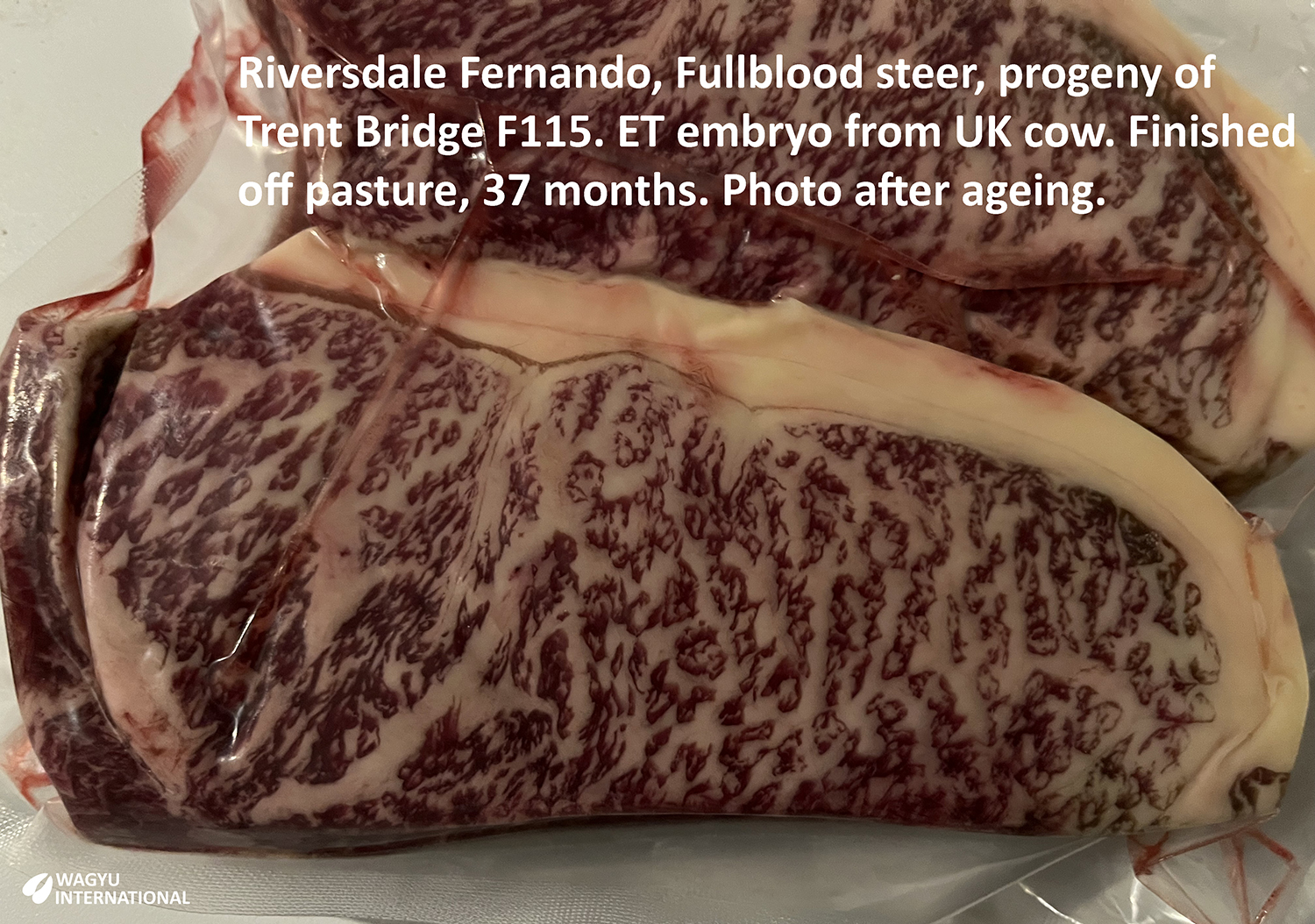
This producer follows local husbandry practices. There are seasonal fluctuations in live weight. The growth rate of two 2020 Fullblood Wagyu steers is shown in the chart below.
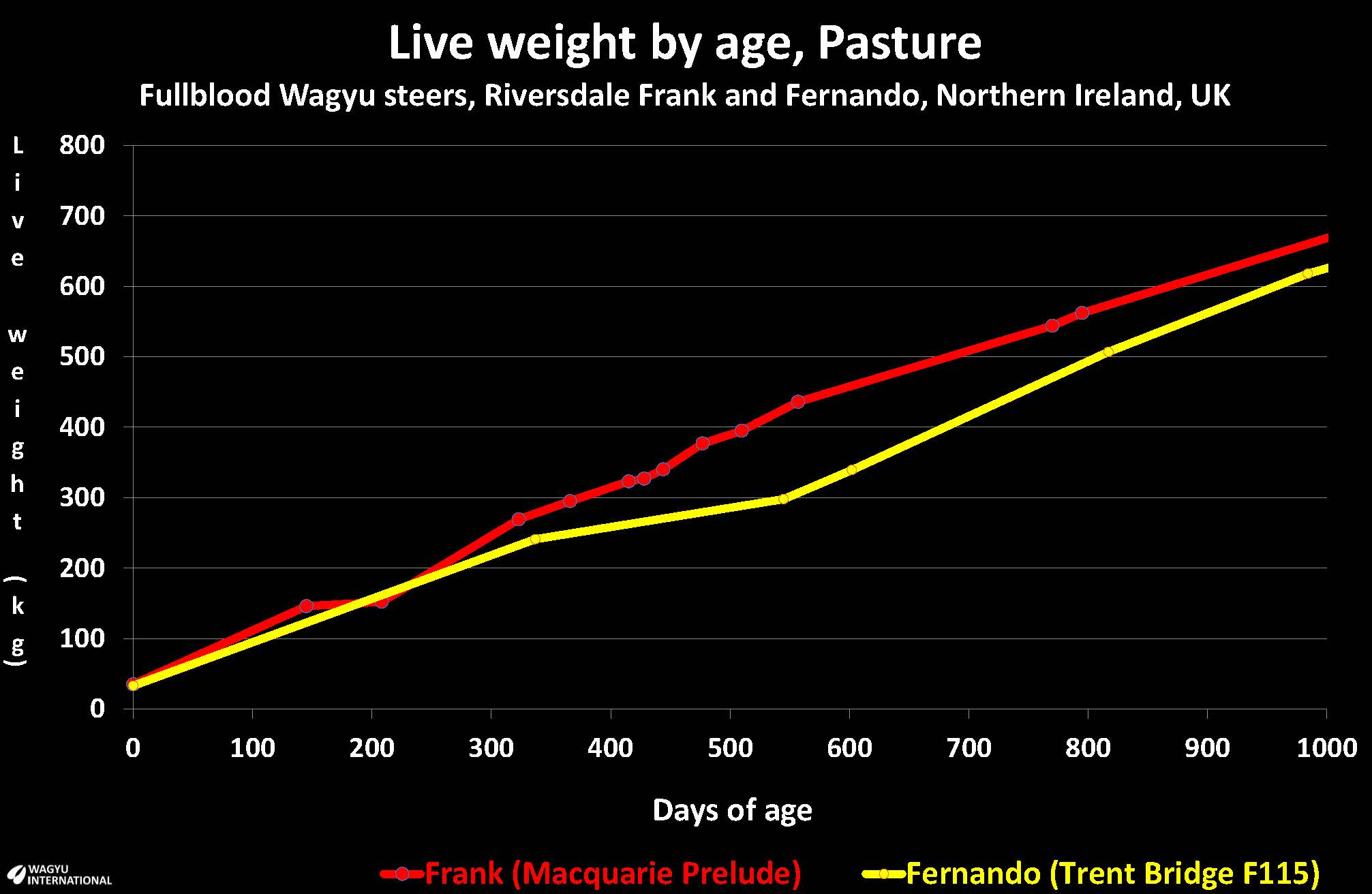
The steer with modest growth rate in this chart of live weight by age up to 1,000 days with the yellow colour is Fernando. He recorded 0.6 kg/day from birth to peak live weight of 678 kg at 34.6 months of age. After a growth spurt when silage had been topped up after inclement weather, there was probably inadequate maintenance energy over the next three months so he lost 76 kg when he was processed at 37 months of age. Despite this setback just before processing, his genomics and perfect growth profile during tissue development had laid down an ideal frame.
An agent told the producer that this steak was the highest marbling that he had seen in Northern Ireland. Sire is Trent Bridge F115 out of an embryo that was raised by Riversdale Wagyu in Northen Ireland from Itoshigefuji TF147, Itozurudoi TF151 and Itomoritaka over Lake Wagyu females so stronger in maternal traits.
Mid-parent EBV predictions appear to be quite harsh for Fernando when the chart is compared to the excellent marbling in the photograph after ageing. Trent Bridge F115 carcass traits have combined well with Maiden's maternal traits:
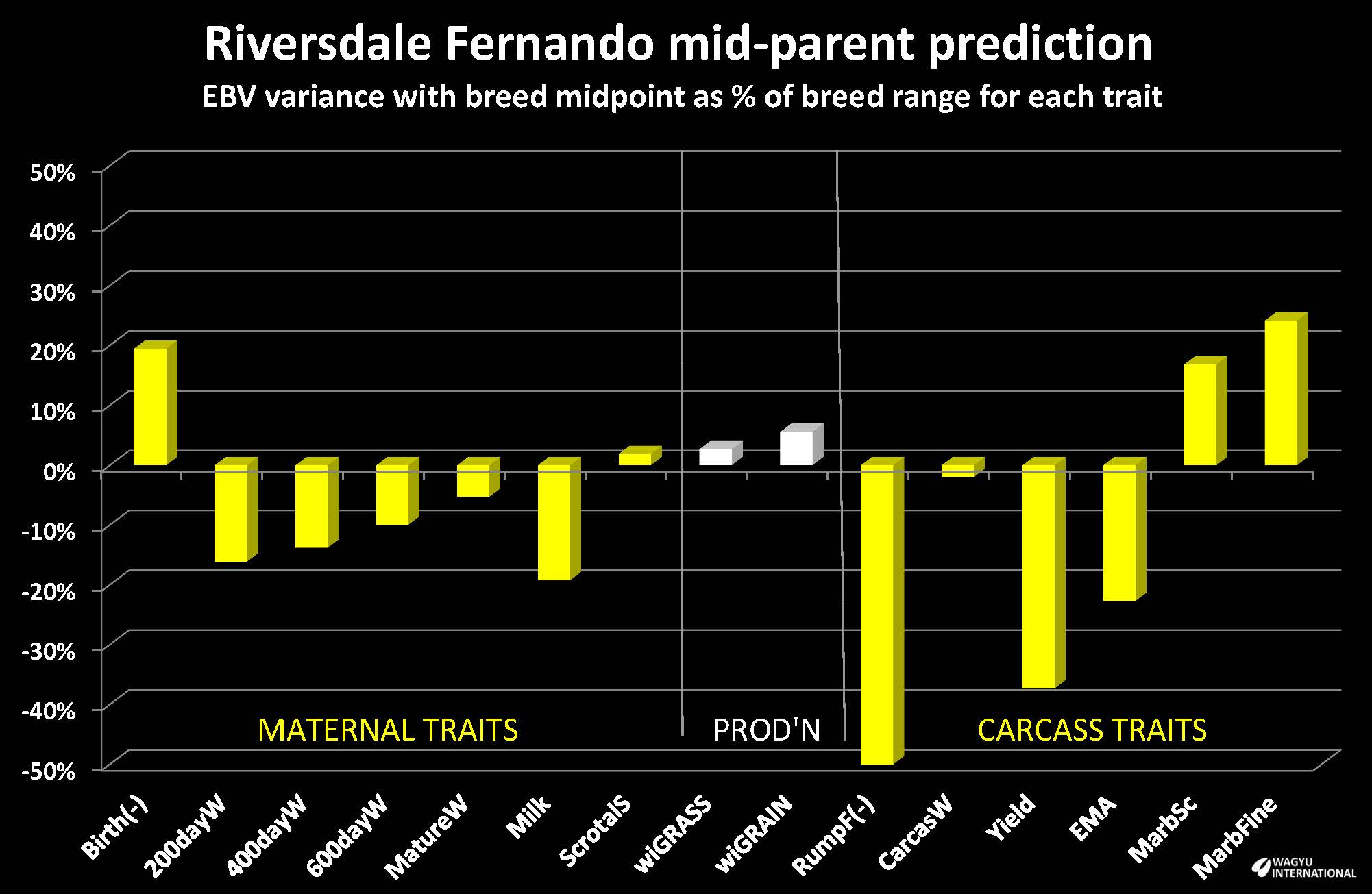
Trent Bridge F115 is Top 17% for EMA EBV and Maiden the dam is Bottom 3%. Fernando's retail cuts of fillet 4.5, ribeye 4.3, ribeye roast 5.6 and sirloin 13.1kg out of total retail weight of 221.9kg from a slaughter weight of 602kg is excellent. The weight of burgers was only 60kg so the lesser value cuts were depleted during the weight loss of 76kg prior to processing. Nevertheless, this is the best example of marbling in the region to date.
The same benefits from the pasture as from intensive grain finishing are obtained in markets where superior eating quality is recognised. It is easy for a sire to produce good results under perfect conditions, but Trent Bridge F115 has given exceptional results under harsh conditions from pasture. The high IMF% catches the eye but strong EMA is important over base breeds and fineness of marbling may be a key factor factor to reducing fat intrusions that are more common during crossbreeding.
Trent Bridge F115 semen is ideal for terminal beef production in both grain and grass finishing over Bos taurus breeds. The best base breeds in Germany are Fleckvieh, Gelbvieh, Charolais and Holstein/Friesian with their weight and milk while F115 brings marbling and carcass qualities together with fat cover over lean breeds.
Low birth weight EBV is another benefit making Trent Bridge F115 better suited to open heifers too.
The following semen is recommended for use in Fullblood Wagyu breeding or Wagyu cross / Fullblood beef production in the UK:
Some countries require different veterinary tests or documentation.
| NAME OF ANIMAL | COLOUR | TYPE | CONTACT |
| Capital Country Apex II R5 | Black | Semen | Wagyu Genetics Jerathe |
| Circle8Bulls Q122 | Black | Semen | Wagyu Genetics Jerathe |
| Lisheen N23 | Black | Semen | Lisheen Wagyu |
| Lisheen P26 | Black | Semen | Lisheen Wagyu |
| Lisheen Q39 | Black | Semen | Lisheen Wagyu |
| Mayura Pioneer | Black | Semen | Wagyu Genetics Jerathe |
| Trent Bridge F115 | Black | Semen | Wagyu Genetics Jerathe |
| WG Hirashiget 045 | Black | Semen | Wagyu Genetics Jerathe |
References
Luebbe 2014. Methane's Impact on Animal Performance - VFAs. University of Nebraska - Lincoln. March 2014.
Ogata et al., 2019. Effects of an increased concentrate diet on rumen pH and the bacterial community in Japanese Black beef cattle at different fattening stages. J. Vet. Med. Sci. 81(7): 968–974
Ogata et al., 2019. Long-term high-grain diet altered the ruminal pH, fermentation, and composition and functions of the rumen bacterial community, leading to enhanced lactic acid production in Japanese Black beef cattle during fattening. PLoS ONE 14(11): e0225448
Osawa et al., 2008. Image analysis of carcass cross-section in Japanese Black Genetic analysis of traits and meat-producing ability traits. Report posted in Japanese by Department of Bioproduction Science, Graduate School of Agricultural Sciences, Iwate University.
DISCLAIMER Wagyu International provides information that has been supplied by other parties and gives no warranty (express or implied) as to the data completeness, accuracy or fitness for a particular purpose.
